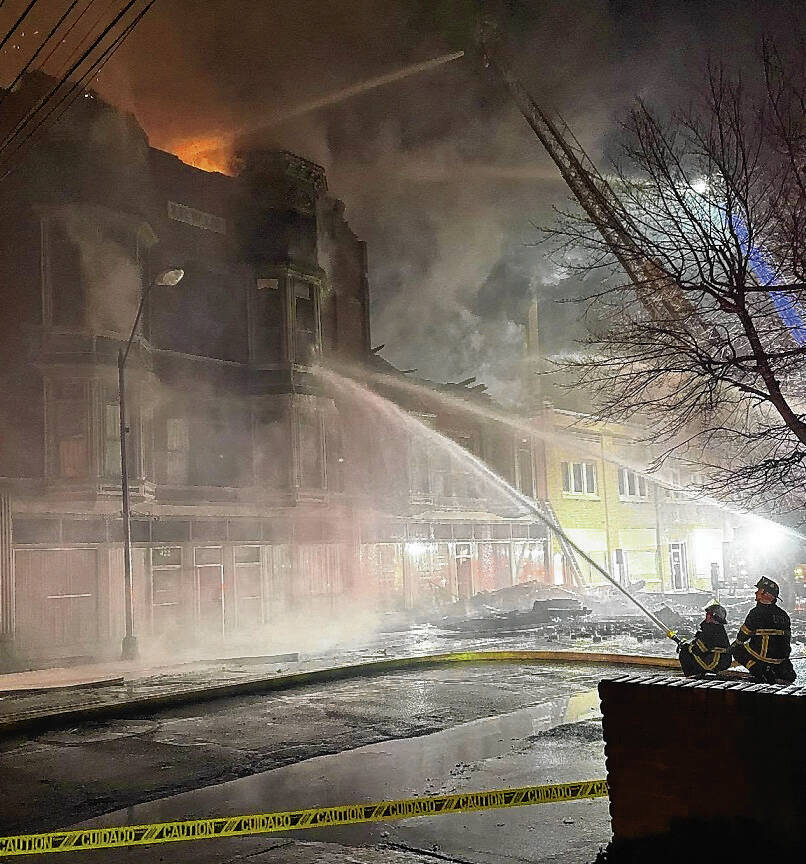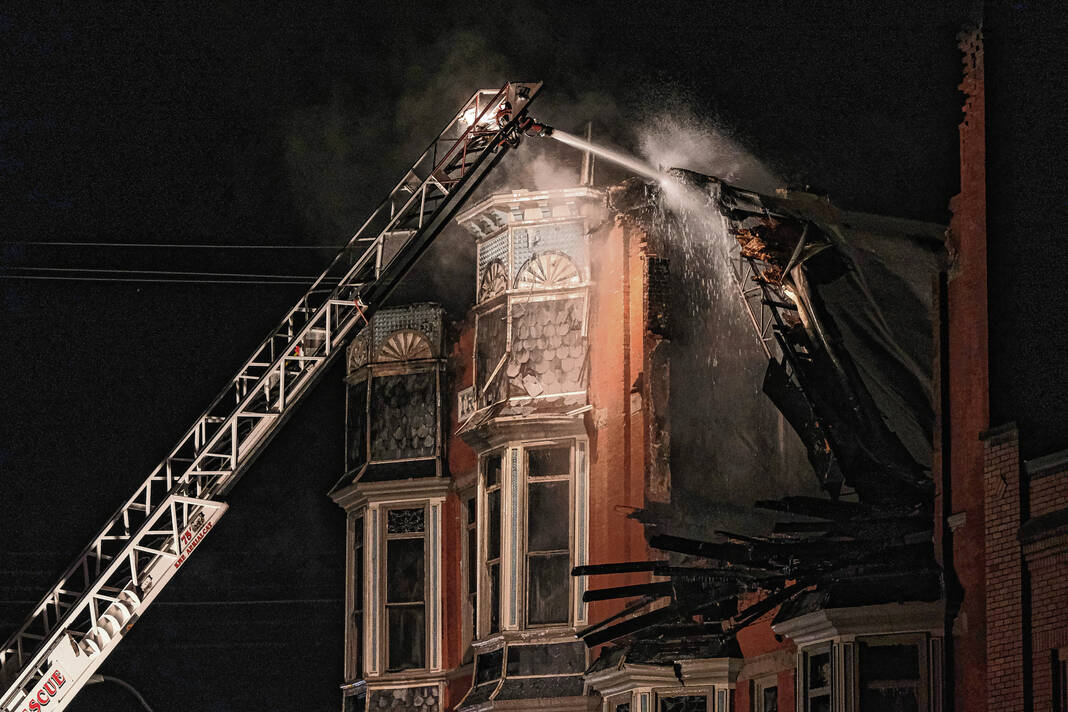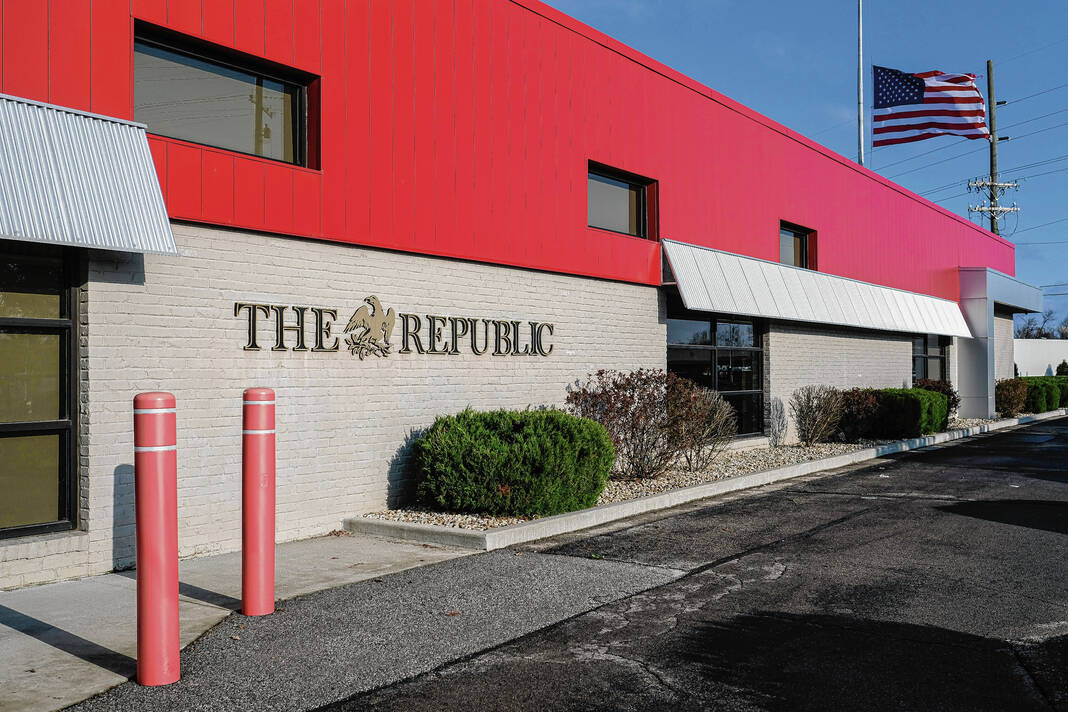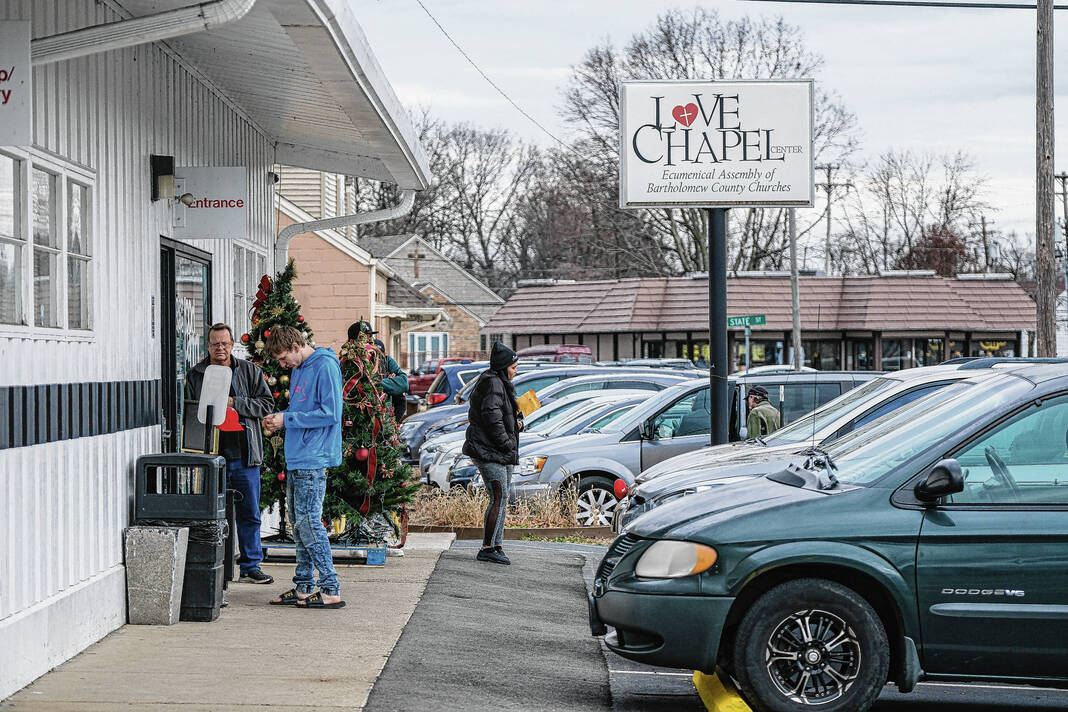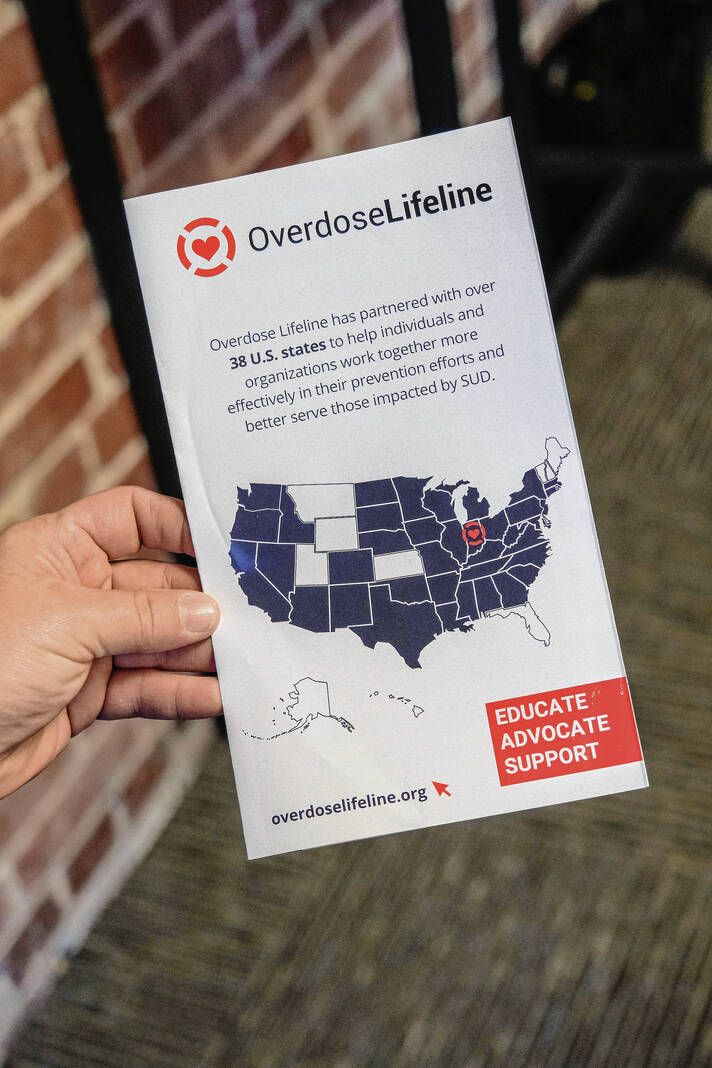
Mike Wolanin | The Republic Columbus Mayor Jim Lienhoop thanks community partners during a ceremony where Columbus, Indiana was named the Indiana Chamber of Commerce Community of the Year in the Cal Brand Meeting Room at Columbus City Hall, Monday, Aug. 29, 2022.
The Republic staff has selected the top 10 stories of the year for Bartholomew County, from a list of dozens of nominations by newsroom staff.
We are also including an honorable mention list as the number of extraordinary events seemed to far eclipse the concept of stopping at 10.
As we move toward 2023, here are some memories of the year that is almost behind us.
1. Local legislators support state’s near-full abortion ban
In August, Indiana became the first state to approve an abortion ban after the U.S. Supreme Court overturned its landmark 1973 Roe v. Wade ruling, which essentially legalized abortion nationwide. The ban took effect Sept. 15, making it a Level 5 felony to perform an abortion except in certain situations. Abortions would be permitted in cases of rape and incest before 10 weeks post-fertilization, to protect the life and physical health of the mother, or if a fetus is diagnosed with a lethal anomaly. Under the law, abortions can be performed only in hospitals or outpatient centers owned by hospitals, meaning all abortion clinics lose their licenses. A doctor who performs an illegal abortion or fails to file required reports may also lose their medical license. Level 5 felonies in Indiana can carry a penalty of one to six years in prison and fines of up to $10,000. Bartholomew County state legislators — Rep. Ryan Lauer, R-Columbus, and Sen. Greg Walker, R-Columbus — voted in favor of the ban and were supportive of more restrictive measures that were ultimately not included in the law. Lauer wanted to force women and girls who become pregnant due to rape or incest to carry their pregnancies to term. Walker voted in favor of a version of the law that would have required rape and incest victims to sign a notarized affidavit attesting to the attack. The law is on hold after lawsuits were filed challenging its constitutionality.
2. Drug overdose deaths hit a record high
Fatal overdoses rose to the highest levels on record, surpassing 2021’s record-high annual death toll. The surge in fatal overdoses — the third consecutive year that overdose deaths have reached record highs — reflect what local officials described as a “worsening overdose crisis” that is being fueled by a more dangerous drug supply and the increasing prevalence of deadly fentanyl in Columbus. Thirty-seven people in Bartholomew County died from drug overdoses so far this year, putting the county on pace for around 42 fatal overdoses in 2022, according to figures from the Bartholomew County Coroner’s Office. By comparison, there were 33 overdose deaths during all of 2021 and 31 in 2020, both of which were records at the time. “An overwhelming majority (of the deaths) have fentanyl in the (toxicology) results,” said Bartholomew County Coroner Clayton Nolting of this year’s death toll. “However, it’s critical to remember that most overdoses are not a result of one drug in particular.”
3. Food insecurity takes center stage
In the aftermath of the COVID-19 pandemic and ongoing economic uncertainty, more families continued to seek help from local food pantries as inflation took its toll on budgets. Kelly Daugherty, who leads Love Chapel’s food pantry, said Love Chapel, 311 Center St., purchased 16,775 pounds of food, followed by 14,390 pounds in May, and finally 10,123 pounds in June. “Up until this year, it had always been less than 1,000 pounds a month — and that was just milk,” Daugherty said. While Love Chapel served an average of 708 households a month last year, that figure soared to 1,007 in July. Nearly 1 in 10 Bartholomew County residents are struggling with food insecurity.
4. Cummins names first woman CEO
Cummins Inc. made history in July by appointing Jennifer Rumsey as its new chief executive officer, selecting the Columbus native to steer the company through the industry’s transition to greener forms of energy. Rumsey, 48, becomes the first woman and seventh person to hold the top spot in the company’s 103-year history. She has been with Cummins for 22 years and was most recently promoted to president and chief operating officer last year, overseeing the company’s global operations. Rumsey replaced then CEO and Chairman Tom Linebarger on Aug. 1. Linebarger, 59, continues to serve as chairman of the board and executive chairman, working with Rumsey on “specific initiatives that position the company for continued success,” including the acquisition of Meritor Inc. Cummins is the largest employer in Bartholomew County, employing about 8,000 people in the Columbus area. The company has 59,900 employees worldwide. Rumsey brings the total number of women leading S&P 500 companies to 34. “I promise you, when I grew up in Columbus, Indiana, I would have never imagined that I would be standing here today as the next CEO for Cummins,” Rumsey said. “… I’m incredibly honored and proud to serve as your next CEO.”
5. Cummins finalizes acquisition of Meritor
Cummins Inc. completed a $3.7 billion deal in August to acquire an automotive parts supplier that used to be a major employer in Columbus. Cummins finalized an agreement to acquire Michigan-based Meritor Inc. for $36.50 in cash per share, a 48% premium on Meritor’s closing price on Feb. 18. The deal is being bankrolled through a combination of cash and debt. Cummins officials have said that they believe the acquisition will accelerate Cummins’ efforts in technologies that curb emissions from commercial vehicles and industrial applications, including Meritor’s ePowertrains. Meritor shareholders overwhelmingly voted in favor of Cummins’ acquisition bid in May, according to filings with the U.S. Securities and Exchange Commission.
6. The Republic celebrates its 150th anniversary
In April, The Republic joined with the community to honor the journalism legacy of Columbus’ local newspaper. The Brown family established the central and enduring role for The Republic within the Columbus community during their six generations of ownership and leadership. Now part of AIM Media Indiana, The Republic and its sister publications in central and southern Indiana continue the daily, community service first demonstrated by the Brown family. This includes objective, balanced reporting, engaging local audiences with a variety of news and features, and helping set the civic agenda and discourse in both print and online for the important issues facing the community.
7. IUPUC to become IU Columbus
Indiana University officials said in November that plans to transform IUPUI in Indianapolis into two independent academic organizations are expected to result in the rebranding of IUPUC within the next couple of years. Officials are continuing to work out the details for an academic “realignment” at IUPUI. Under the terms of a memorandum of understanding approved in August, IU will continue to own and operate the Indianapolis campus and will take over operation of what is now IUPUI’s School of Science, except for the Department of Computer Science, which will become part of Purdue. Officials expect that the IUPUI campus will be rebranded as Indiana University Indianapolis. University officials expect IUPUC — which is a regional division of IUPUI — to undergo a rebranding of its own and focus entirely on IU degree programs. “I fully expect that IUPUC will become IU Columbus and continue to be a part of the IU Indianapolis operation,” IUPUI Chancellor Andrew Klein said. “The programs that IU runs in Columbus are really important to the state and to the Columbus community, and I fully expect those will continue, and hopefully, grow and thrive.” Officials will need the 2023-24 academic year to implement the new arrangement, with the new structure taking effect for the 2024-25 school year, or July 1, 2024, when the two universities start new fiscal years and the local campus will be IU Columbus. IUPUC has just more than 1,400 students.
8. Library faces protests over teen section materials
The Bartholomew County Library drafted a community survey about library materials for distribution and is working on a diversity audit of all items in its teen collection after a group of protesters attended a series of library board meetings this summer and attempted to have books related to the LGBTQ community banned or moved to other sections of the facility. A separate group of library patrons labeled the effort as censorship. The community survey will be on the library’s website and at the facility in January.The diversity audit of all items within the teen collection will document a book’s author, title and protagonist and categorizes each in terms of race, ethnicity, religion, sexual orientation, disabilities and age. Once the data is complete, the information will be utilized to develop a plan that utilizes best practices from libraries across the country. The audit is expected to be complete by Feb. 17.
9. Columbus honored, changes classification
In the same year Columbus was named Community of the Year by the state Chamber of Commerce, the Columbus City Council approved an ordinance changing the city of Columbus from a “third class city” to a “second class city.” Columbus will officially become a second class city on Jan. 1, 2024. The change will entail certain changes to city government structure, including the addition of two more city council members. Indiana’s second class cities each have a legislative body made up of nine members — six members representing six districts and three at-large members. Columbus City Council is now made up of five district representatives and two at-large.
10. Fire destroys historic Irwin Block building
The cause of a Dec. 3 fire that destroyed the historic Irwin Block building on Fifth Street in downtown Columbus has been ruled “undetermined.” The building at 422 Fifth St. has been condemned by the city after the fire. Columbus Fire Department public information officer Mike Wilson said the building did not have a sprinkler system for fire suppression, but a building connected to it through a fire wall, which held, at 440 Fifth St., did have a sprinkler system. The State Fire Marshal’s office was called in to investigate as well as city fire inspectors. Two “office cats” survived the fire, the first who escaped during the fire on Dec. 3 and the second who was found inside an office by Wilson, who took cat treats and food inside and called for it at the request of its owner.
Coming Saturday
Our 2022 Year in Review section, an annual look back at major news and events in the life our our community, will publish in Saturday’s edition of The Republic.


